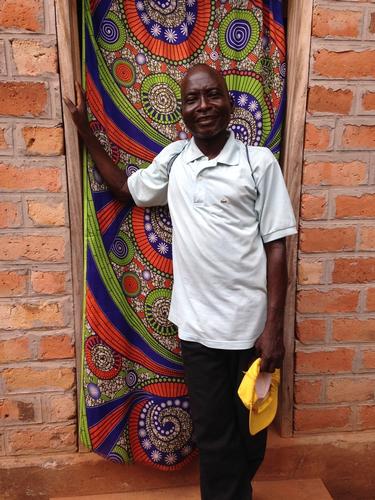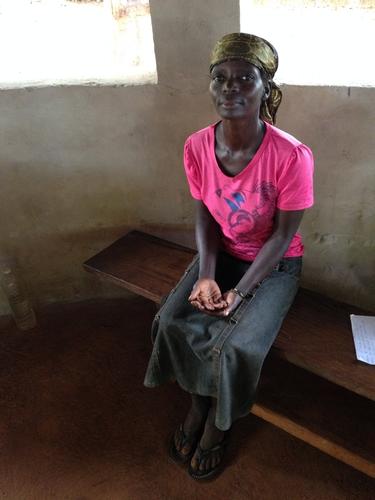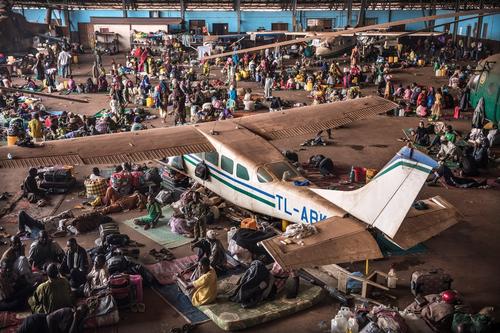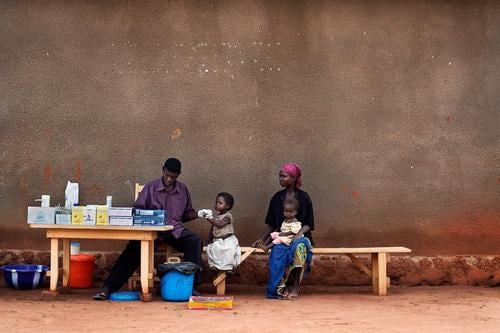In Zémio, in the far southeast of the Central African Republic, MSF has partnered with the local Ministry of Health to support a 30-bed health centre with inpatient, outpatient, maternity, laboratory, and HIV/TB services, as well as run an outreach programme. The project started in 2010 in response to a large influx of Congolese refugees and internally displaced people who were forced out of their homes due to repeated violent attacks by the Lord’s Resistance Army (LRA). The Zémio health centre remains one of the only secondary care facilities in this rural region and receives patients from as far as 250 kilometres away. In these two stories, Keri Geiger, an MSF nurse inZémio, speaks with two patients from the HIV programme. Jean Pierre, while gravely ill, was carried on a bike by his brother for more than 130 kilometres to the centre, over the border from Congo. Gisèle was one of MSF’s first patients in Zémio.

Name: Jean-Pièrre
Age: 53
Location: Zémio, Central African Republic
Nationality: Congolese
Jean-Pièrre comes from Democratic Republic of the Congo. He is the type of person who loves to talk about his children and his grandchildren. But he hasn’t seen them since 2012.
After the war in Congo, Jean-Pièrre was in bad health. He was tired and weak, unable to work. “I was in a critical state,” he tells me. He knew he needed to be tested for HIV, but the closest testing centre in Congo was over 400 kilometres away. That’s when he decided to come to Zémio, which, at 132 kilometres away, was much closer but across the border in the Central African Republic. The journey took five days on a bicycle. Jean-Pièrre, of course, was too weak to help pedal. But his brother carried him on the bike, knowing that in Zémio, MSF had a programme that could help.
Jean-Pièrre tested positive for HIV. At first, his life in Zémio was difficult. It takes time to recover strength after being so sick for so long. And of course, Jean-Pièrre was an outsider in CAR. Jean-Pièrre became used to hearing, “He has AIDS, he has AIDS, don’t touch him”. He wonders what would have happened to him if some members of his church had not brought him food. To make matters worse, Jean-Pièrre was not improving clinically. He continued to be plagued by weakness and stomach pains, two of the most common complaints among the HIV cohort in Zémio. His CD4 count remained low, but he stayed in Zémio knowing that the treatment MSF offered could save his life.
After two years, the MSF team realized that Jean-Pièrre’s treatment regimen was failing him. After many more tests and consultations with HIV experts in Europe, Jean-Pièrre was changed to second-line antiretroviral drugs in 2015. Little by little, he began to get better, to recover his strength, his spirit. He continues to suffer from muscle pain, joint pain, fatigue, jaundice, and stomach cramps. If he doesn’t eat a good meal before taking his antiretroviral pills at night, he feels very sick or has nightmares. Still, he keeps taking the treatment, knowing that these drugs are keeping him alive, and he does finally feel like he’s slowly regaining his health.
Jean-Pièrre has many plans for his future. He says he has seen me running through the town in the morning and he would like to be strong enough to do something like that one day. He also wants to start a business. He works as a farmer, but he only grows enough to keep himself fed. He is interested in making soaps, but it costs a lot of money to set up a market stall. If he was able to have a small business, he could hire labourers to take care of his fields. Then he might be able to travel home regularly to see his family. When I ask if he has had any contact with them since he left Congo, he explains that it is difficult to communicate across the border because there is no mail service and phone calls are too expensive. And because of his ongoing health problems, travel is still impossible. “One day, maybe,” he tells me. “This is a treatment for life. If you follow the programme, you know that over time your health will get better. Life is always a struggle, but there are moments of happiness.”
As for the town of Zémio, Jean-Pièrre feels there is still some work to be done to end the stigma of living with HIV. He is happy that MSF will continue to work with the community to increase their understanding of the disease. “Sensitise the population. Create better respect for people with AIDS. More people die of malaria or tuberculosis,” he says. But he does feel like things are getting better for him and his community of Congolese refugees. “Thank God for MSF. You bring hope to my community.” *

Name: Gisèle
Age: 35
Nationality: Central African
Location: Zémio, Central African Republic
Gisèle has lived her entire life in Zémio, the same as her parents. Though her father has died, she still lives with her mother right next to the Zémio health centre.
Back in 2008, before MSF had come to Zémio, the health centre was run by the Central African Ministry of Health. During that time, Gisèle became very sick. Her abdomen was constantly bloated and she suffered from severe fatigue. When she finally stopped getting her periods, she decided to go to the health centre for help, and that’s when she learned she has HIV. “I used to be tired all the time. I couldn’t work. I didn’t feel well,” Gisèle told me. But the physical problems weren’t the worst part of HIV. “My father’s family abandoned me when they learned I was HIV positive,” she says. Only her mother stayed with her. “With this disease, I lost everything in my life that was going well.” Fortunately, the Ministry of Health doctor who worked at the Zémio health centre helped her start antiretroviral and co-trimoxazole treatment, and little by little, she began to feel better. Her health improved and she started to see that life with HIV is possible. But living in Central African Republic has its own challenges.
In 2010, Gisèle’s doctor was killed by the LRA. Her access to treatment was cut off. For the next year, Gisèle searched for another way to get her medications. She went to other villages, to other health posts, but none of the medications they gave her worked. She was at a loss for what to do next, and she felt as bad as she had before she started treatment. When MSF came to Zémio and opened the HIV programme, Gisèle was one of the first patients. She re-started her antiretroviral treatment and immediately began to feel better. “Sometimes the medications make me tired, but when I take them like I am supposed to, I feel like I am in good health,” she says. Gisèle has now been under MSF care for five years, and she has never had a problem with taking her medications because she knows that they have saved her life. “Sometimes people with HIV get sick, but not if they take their medications well,” she tells me. “When you take the medications like you’re supposed to, you can stay in good health.”
“Now I am strong. I am able to work for my church like I want to. I feel like now that I have the strength, if only I had the money I could build my own house, my own bed.” She lights up when she tells me about her work. It’s clear that she loves being a part of this community.
Gisèle is a regular attendee of the HIV support group at the health centre. She tells me that the support group is good, but it is not enough. She feels that the community still lacks knowledge about HIV and more could be done to engage people in a discussion about the disease. “We need people to understand what it’s like to live with HIV,” she says. But for now, Gisèle is happy share her story with me. “I’m happy to talk to you about this anytime,” she assures me. “I’m always available to help you. It’s because of MSF that HIV positive people in Zémio can continue to live.” *
MSF started providing free medical care in Central African Republic (CAR) in 1997, at a time when mortality rates in some regions were up to five times the emergency threshold. In the years since, CAR has continued to face a situation of chronic and prolonged health emergency. The political crisis and renewed violence that have shaken the country since 2013 have exacerbated the health situation, leaving 72 per cent of the country’s health facilities damaged or destroyed. In response to the recent crisis, MSF has doubled the size of its medical response, and now runs 17 projects across the country. Currently, one in five Central Africans are displaced from their homes, either within CAR or living as refugees in neighbouring countries.
* Story as told to MSF Nurse, Keri Geiger






